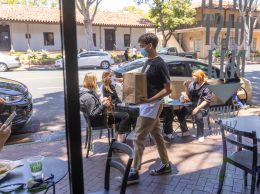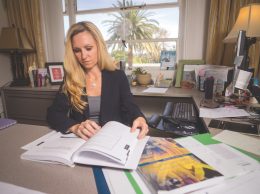It’s time for Gov. Gavin Newsom to rethink his Southern California Stay at Home order and create a sub-region for the Central Coast that is less burdensome on small businesses, especially restaurants that can safely operate outdoor dining areas.
The 1.5 million residents of Ventura, Santa Barbara and San Luis Obispo counties are being ill-served by the order, which is cutting out the lifeblood of the economy and, as a Los Angeles court ruled Dec. 8, imposing arbitrary restrictions on a hard-hit part of the economy that has not been linked to superspreader events.
In a rare but welcome show of unity, the boards of supervisors of Santa Barbara, Ventura and San Luis Obispo counties have joined forces to petition the state. Chambers of Commerce have also joined the effort, with the Santa Maria Valley Chamber being among the first to seize the opportunity to organize its members.
The newly formed South Coast Santa Barbara Chamber has endorsed the measure as well and was working on a statement a press time.
As Ventura County CEO Mike Powers put it in a statement: “A smaller regional approach is important for our community members and struggling businesses. It’s reasonable to have the Central Coast as one region instead of including our county with half the state’s population in the current Southern California Region.”
We’d point out that while Ventura County does have a rising number of cases and intensive care unit utilization, it has resources to manage its caseload. Santa Barbara County has already launched a “Masked and Mighty” education program aimed at protecting citizens and businesses.
SLO and Ventura Counties have their own educational programs and Ventura County’s efforts can be found at www.venturacountrecovers.org.
As the many statements have pointed out, there is nothing in the proposal to stop the region’s hospitals from responding to requests for emergency use of their excess capacity for either COVID-19 or non-COVID patients.
Letting the three counties operate as a sub-region and allowing them to coordinate their pandemic response efforts will provide efficient and targeted relief for the coming months until a vaccine arrives.
That should be the goal, rather than lumping our region in with another 22 million people in order to make life easier for bureaucrats in Sacramento.
DEFENSE BILL INCLUDES BOATING SAFETY
The National Defense Authorization Act, speeding through Congress with veto-proof votes over the objections of the White House, contains important provisions to address safety deficiencies revealed in last year’s Conception dive boat tragedy.
U.S. Reps Salud Carbajal and Julia Brownley and Sen. Dianne Feinstein, all Democrats, said their Small Passenger Safety Act provisions were included in the defense bill speeding through Congress.
Following National Transportation Safety Board recommendations, the bill mandates improved escape routs for passengers on all vessels, improvements to safely store and charge electronic devices, interconnected alarm systems and monitoring to make sure that watches are posted at night.
These are scant comfort for the families of the 34 people who perished off Santa Cruz Island last September. But they are steps in the right direction and important developments if the Pacific coast dive boat industry is going to mount a successful comeback.






 Print
Print Email
Email

















